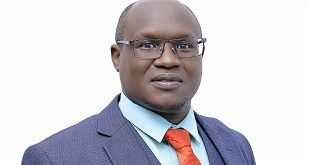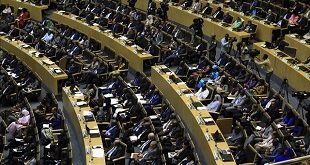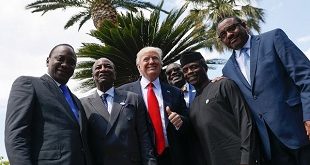
By Eriasa Mukiibi Sserunjogi
UPC me off
MP Betty Amongi walks tight rope between two party camps
Shortly after the February presidential which he lost, opposition Uganda Peoples Congress (UPC) President, Olara Otunnu, summoned Betty Amongi, who had won the Oyam South MP seat.
Otunnu’s intelligence had alerted him that Amongi was a front-runner in the race to be the UPC whip in parliament. For Otunnu, this presented a problem; Amongi is a consort of his archrival in the party, Lira Municipality MP Jimmy Akena. Otunnu had decided that certain things needed to be cleared.
Otunnu told The Independent that Amongi and Akena had undermined some UPC candidates during the election; that they had asked party members especially in Lango and parts of eastern Uganda that UPC had no presidential candidate for 2011 and asked them to support President Yoweri Museveni; that the campaign had led UPC parliamentary candidates in Lango, like former Erute MP, John Odit, to lose the election.

Otunnu does not say what Amongi told him. But after their meeting, Otunnu “appointed” her whip. UPC insiders say Otunnu’s strategy was to use his rapprochement with Amongi to signal a cooling off to the Akena challenge. Recent events show that strategy failed.
In a revealing incident on Aug. 17, under the full glare of the nation’s press, Akena had to be restrained from punching Otunnu. And it all started with what was or was not, a slip of the tongue.
Otunnu had called a press conference and, quite unusually, Akena chose to attend. Akena had arrived with his cousin, Lucy Ajok, the Apac woman MP and a gang said to be from an Akena-funded pressure group to oust Otunnu. Their mission soon became apparent. At question time, Akena was first to raise his hand seeking to ask a question. Otunnu was apparently thrown off balance. His tongue slipped.
“I was the one who made the exception and allowed you, even though you are not a member of the party, to ask your questions,” he told Akena glaringly. Although Otunnu later said he meant to say “press” and not “party”, the rest, as they say, is history.
Weeks later, like scavengers feasting on the decomposing body of their party, the two foes are now trying to exploit the incident.

Otunnu holds the moral high ground and has played the magnanimity card with the ingenuity he used to display when he worked as a top United Nations diplomat.
In the past, to counterbalance Amongi’s power in parliament, he appointed Otuke County MP, Rev. Fr. Jacinto Ogwal, who was his preferred choice for whip, chair of the UPC parliamentary caucus. In the 8th Parliament, the two positions were merged, held by former Chua MP Livingston Okello Okello.
In another move to ‘take the war to Akena’, as a senior UPC member put it, Otunnu also appointed John Odit secretary general. Otunnu’s mind was on Lango, the ‘cradle of UPC’ since it is Obote’s birth place. Akena is son to Milton Obote, the UPC leader whose name almost became synonymous with the party. Akena’s group had reportedly been telling the Langi that Otunnu, who hails from Acholi, was bent on ‘invalidating’ Obote’s achievements.
This time, he deployed his vice president, Joseph Bbosa, to tell the media that Otunnu had “forgiven Akena” for the incident. However, there is a caveat; Bossa said there are many party members still clamouring for Akena to be “punished”. It is a hook. Otunnu, the consummate diplomat is uncomfortable with a bare-knuckled fight. He wants to kill off Akena while massaging him at the same time. Insiders in UPC say it is a strategy Otunnu has used to deadly effect before.
The move is similar to when, on June 27, a well-orchestrated delegation of Langi UPC ‘elders’ called a press conference at Uganda House in Kampala to petitioned Otunnu to take action against Akena for ‘undermining the party’. They said ‘it is not impossible’ for Akena to be dismissed from the party if ‘he continues to work against its interests’.
Akena dismissed the group as ‘stage managed’, charging that most of the people in the group were actually not Lango elders, save for a one Nasir Ogwang, who he said has been “venomous for years”.
This time as always, Otunnu is keeping many balls in the air. He has also drawn in a Trojan scarecrow, President Yoweri Museveni, and painted him to be a mortal embrace with Akena.
Otunnu told The Independent those opposed to him are being facilitated by Museveni to destabilise UPC. Moses Nuwagaba, the UPC spokesperson, says they have information that Inspector General of Police Kale Kayihura “severally met the Otunnu-Must- Go group in different Kampala hotels and at Communications House on March 27”.
“Museveni’s nightmare scenario seems to revolve around Olara Otunnu and when UPC comes into the picture, it becomes complete horror,” says Otunnu. He says he is aware that Museveni is most concerned with him because when he talks about returning Uganda to democratic governance, he means what he says.
It is not all unwarranted Otunnu self-praise. Sources in UPC and those close to the Interparty Cooperation, the loose gang that campaigned to oust Museveni in the February election, say Otunnu crafted many of the ideas and strategies used. He drafted many of their documents.
To make his point, Otunnu likes to tell a of story Museveni’s interest in UPC that involves its erstwhile Buganda Vice Chairman Henry Mayega, who crossed to the NRM during the last campaigns.
Otunnu says one day, UPC Chairman Edward Ruranganga approached him about a ‘stray’ e-mail from Mayega.
The e-mail, says Otunnu, was meant for NRM secretary general and now Prime Minister Amama Mbabazi but ended up in Rurangaranga’s mailbox by accident.
It was “talking about some things which were due and certain payments” Mayega expected from Mbabazi. Otunnu says at the time he suggested to Ruranganga that someone was probably “trying to divide us”.
In retrospect, Otunnu now says Mayega’s crossing to the NRM exposed his “covert” methods.
Otunnu says he has since heard that former UPC chairman Badru Wegulo also had “relations with Museveni going backwards”. He says Museveni’s new strategy is to use former death row inmate Chris Rwakasisi as the conduit of money to fund anti-Otunnu activities, Akena as the political head, and police chief Kale Kayihura to provide security.
Akena’s woes
Akena’s opponents say Museveni could easily enlist him because of his ‘lack of academic papers’. They allege that Museveni threatened Akena that if he does not ‘partner’ with him, he would start a process to throw him out of parliament, and also lose a chance to lead UPC.
Akena blames talk of his lack of papers on the Otunnu camp.
“If they feel I don’t have papers, let them go to court,” he says. He says Otunnu’s camp went up to his school in Kenya to dig for information.
Akena, who declined to serve in Otunnu’s cabinet after the March 2010 Delegates Conference where Otunnu defeated him to the party presidency by 623 votes to 108, says Lango UPC leaders want him to only serve at senior level. Otunnu had offered to appoint Akena vice national chairman.
Akena says apart from winning his own seat, he also campaigned for six other UPC MP candidates in Lango. Poking fun at Odit, Akena says if the two-term Erute county MP can say that Akena caused his defeat through ‘remote control’, what type of MP was he? He challenges Otunnu’s group to produce evidence that he campaigned for any NRM candidate.
He says he could not campaign for Otunnu because, he says, his party leader did not have a ‘relevant and consistent’ message to the voters. Akena says Otunnu spent more time on Electoral Commission Chairperson Badru Kiggundu, International Criminal Court and Blue Book instead of canvassing for votes. “Some voters were being led to believe that Kiggundu was also a candidate,” he said.
Akena has said publicly that he has “come across some sinister plots” to throw him out of the party.
Akena’s strategy
Secretary General Odit on July 11 wrote the board of the Milton Obote Foundation (MOF), which finances most of the party activities and of whose board Akena is a member, asking them to investigate and take action on accusations made about Akena. Akena interpreted this move as meant to throw him out of UPC.
A member of the MOF board told The Independent that the body injected over Shs 800 million in the last UPC campaigns and it is “very much the reason people are fighting to control UPC”. MOF, which was founded by Obote for philanthropic purposes, manages Uganda House and other properties.
The pro-Akena pressure group has also been holding meetings across the country, calling for Otunnu’s ouster.
On July 23, members of the pressure group from the districts of Masaka, Sembabule, Rakai and Lyantonde raised a notice of impeachment against Otunnu in a document dubbed ‘Masaka Declaration’.
Ben Bakkabulindi Kigongo, who signed the document as ‘Chairperson Elect Central Region’, told The Independent that they are ‘rolling out’ the idea of Otunnu’s censure to all parts of the country. The petitioners are required to raise signatures of one third of the members of the delegates conference and one half of the members of the National Council.
The reasons listed for Otunnu’s censure include “boycotting the 2011 general elections”, “failing to produce a manifesto for the 2011 election and failure to fund party candidates”, “backing the 1985 coup”, “contradictory political policies”, “mismanaging grassroots party elections” and “failure to deliver on his Namboole (delegates conference) promises”.
In the winding thicket of accusations and counteraccusations, sources say the “UPC grassroots” were fed on the rumour that Otunnu had thrown all Obote’s portraits out of Uganda House, causing rage. It turned out that floor 6 of Uganda House, the seat of the UPC, was being renovated and the headquarters temporarily shifted to floor 8. Obote is a sensitive topic for Otunnu as he is accused of backing the 1985 coup against Obote.
This point was also made by Chris Rwakasisi, a former security minister in Obote’s government who went straight into campaigning for Museveni after his release from Luzira prison on a presidential pardon. Rwakasisi was on death row for murder.
Rwakasisi hit the campaign train, telling rallies and radio stations in Lango that Otunnu, along with his uncles Bazilio and Tito Okello, overthrew Obote. As security minister, Rwakasisi said, he was in position to know.
“Absolute nonsense,” says Otunnu. He says having explained to the delegates, he “easily won the party presidency in the 2010 Delegates Conference despite the fact that the accusation was commonplace”. He says he first consulted with Obote before joining the Okello-Okello government, and that he visited him thrice to consult during the 1985 Nairobi talks.
Otunnu says he used to visit Obote in Lusaka, and it is where he first met Akena. Otunnu adds that Obote personally signed and sent, through party strongman Chris Opoka, Otunnu’s UPC membership card when he was in New York.
It appears that for now, the Otunnu group charge that the mood in Lango is shifting against Akena, remains strong. “This is why the UPC Pressure Group is most active in Busoga, Buganda and the West,” said one party member.
 The Independent Uganda: You get the Truth we Pay the Price
The Independent Uganda: You get the Truth we Pay the Price


